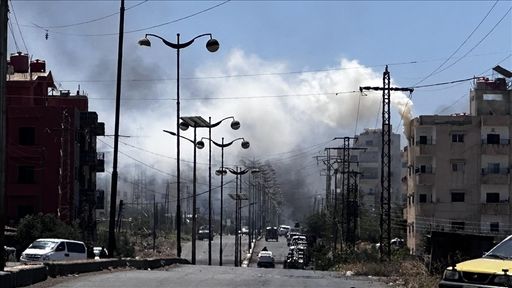Israel has intensified its bombing of Syria's Sweida province, in what the Syrian government has called a "treacherous aggression" and a grave violation of international law.
"This criminal act constitutes a blatant violation of the sovereignty of the Syrian Arab Republic, a flagrant breach of the principles of international law and the Charter of the United Nations," the Foreign Ministry said in a statement on Tuesday.
"It is a reprehensible example of ongoing aggression and external interference in the internal affairs of sovereign states."
The Israeli air strikes come at a time when the administration of US President Donald Trump has lifted sanctions on Syria, and Damascus is finally trying to resume trade and finance with other countries after years of seclusion.
What’s happening?
The Israeli air strikes began early on Tuesday and are continuing even as Damascus announced a ceasefire in clashes between Druze militias and Bedouin tribal fighters, which killed at least 30 people and injured over 100 others since Sunday.
Israel has struck Syria several times in the name of protecting the Druze. Still, the spiritual leadership of the Druze community in Syria has urged all armed factions in Sweida to surrender and cooperate fully with Syrian government security forces.
The Druze are a minority group whose faith originated as an offshoot of the Ismaili sect of Shia Islam but later developed into a distinct and more independent belief system.
The Druze community is primarily concentrated in Syria’s southern province of Sweida, with additional populations in certain Damascus suburbs, particularly Jaramana and Ashrafiyat Sahnaya. A small minority of Druze also lives in Israel.
The Syrian government has pledged to protect the Druze and involve them in political processes.
Deeper dive
Within the community, opinions are divided on how to navigate the current political landscape.
Some Druze advocate for engagement and dialogue with the authorities, whereas others favour a more assertive or confrontational stance.

Tensions recently escalated after members of the Bedouin tribe in Sweida reportedly set up a checkpoint, assaulted a Druze individual, and stole from him. This incident sparked a cycle of retaliatory violence and abductions between the two communities.
Although government forces were sent to stabilise the region, sporadic clashes continue.
Officials have attributed the unrest to so-called "outlaw groups" and responded by imposing a curfew in an attempt to contain the situation.
The recent Israeli "aggression", as the Syrian Foreign Ministry puts it, comes on top of the continued Israeli occupation of Syrian territory in the country's south.
Over the past three months, the Israeli military has established at least 10 new bases in Syria's southern provinces of Quneitra and Daraa, further expanding its presence in violation of the 1974 Disengagement Agreement.
Soon after the regime's fall in December last year, Israel intensified its air strikes across Syria. It extended its military offensives beyond the occupied Golan Heights into the demilitarised buffer zone — an area designated as neutral under the agreement brokered after the 1973 Yom Kippur War.
The bases built by Israel are generally located near strategic hills and intersections of major roads, particularly in rural Quneitra.
These locations are designed to monitor nearby villages directly and have led to the mass displacement of Syrians.
The Syrian government has rejected Israel's declaration of a demilitarised zone and has, along with the international community, repeatedly called on Israel to cease military actions that violate its sovereignty.
While Israeli Prime Minister Benjamin Netanyahu has said Israel will not allow a "second Lebanon" to be established in southwestern Syria, Damascus has accused Tel Aviv of pursuing sinister objectives aimed at destabilising the country.
Israeli attacks came "at a calculated moment and within a suspicious context, clearly aimed at undermining national stability and striking at Syrian unity at a critical juncture in which the state is working to consolidate security and emerge from the aftermath of war", the Syrian Foreign Ministry said.

What's interesting in this development is that the Israeli actions in Syria do not enjoy the support of Tel Aviv's biggest ally and primary weapons supplier: the United States.
The US' Syria envoy Tom Barrack said Washington was in contact with all sides "to navigate towards calm and integration", but Axios, citing a US official, reported that the Trump administration had asked Israel to stop its strikes on Syrian military forces.
Israel hasn't budged and has taken an aggressive stance toward Syria's new leaders since Assad's fall.
Israeli forces earlier occupied a UN-patrolled buffer zone on Syrian territory along the border with the occupied Golan Heights and have launched hundreds of air strikes on military sites in Syria.
The Trump administration has been pushing for the new Syrian government to move toward normalisation with Israel.
Syrian officials have acknowledged holding indirect talks with Israel to attempt to defuse tensions, but have not responded to reports that the two sides have also held direct talks.
The recent escalations by Israel don't help the case, either.
On Tuesday, Israel's Diaspora Affairs Minister Amichai Chikli called for the elimination of Syrian President Ahmed al Sharaa, Israel Hayom reported.
Chikli's statement comes even as diplomatic efforts continue to promote a potential security agreement between the two countries.
Syria's Foreign Ministry called for "all countries and organisations to respect the authority of the Syrian Arab Republic and refrain from supporting any separatist rebel movements".
In a statement, it urged Syrians to "cease acts of violence, surrender illegal weapons and thwart those seeking to dismantle the Syrian social fabric and sow discord and division".



















